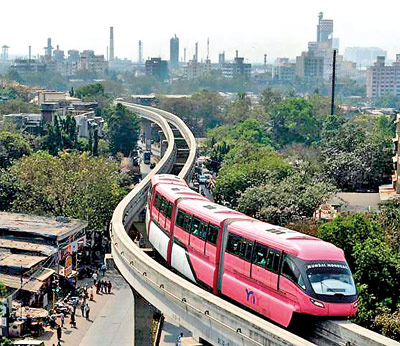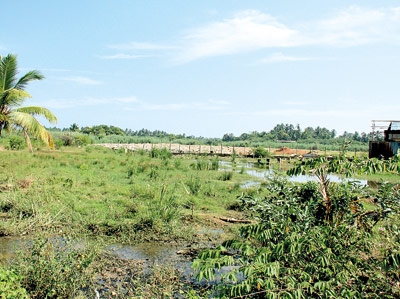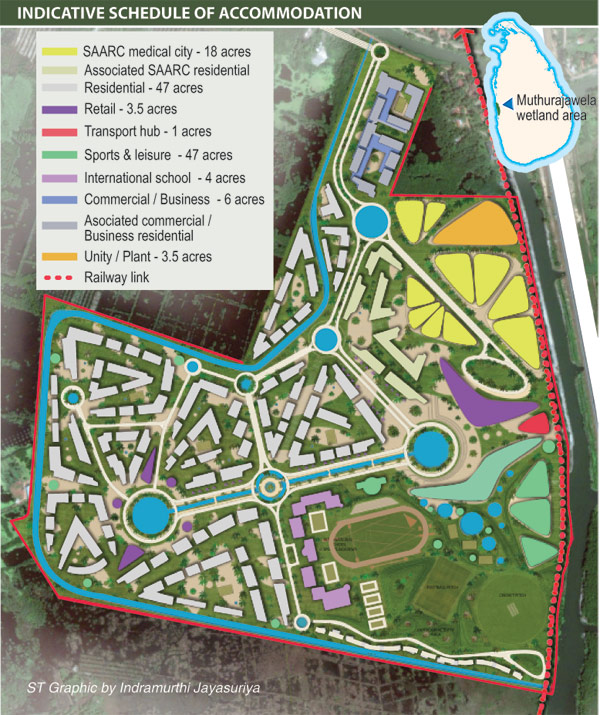News
Airport-to-Colombo monorail can cause floods, wipe out wildlife
Environmentalists have come out in opposition to the proposed monorail project from the Bandaranaike International Airport to Colombo city via the Muthurajawela marshlands, saying it would wipe out many species of wildlife there.

The Mumbai monorail makes its way through the city’s eastern suburbs during a run between Wadala and Chembur. AFP
So far, no Environmental Impact Assessment (EIA) report has been carried out on the project despite an agreement having been signed between the Board of Investment (BOI), Airport Express Air and Rail Company (Malaysia), the Chairman of Biodiversity Conservation and Research Circle, Supun Lahiru Prakash said.
Land within 100m of a reserve can legally only be developed after obtaining an EIA, Mr. Prakash said, pointing out that the proposal is for the 42km monorail track to run through the middle of the reserve.
About 150 acres would also be used to create a commercial city in Bopitiya, causing further damage to the wetlands, he said.
“The government is repeating the same mistake as the previous one by trying to fill the wetlands,” Mr. Prakash said.
Muthurajawela was named a wetland internationally in 1989 and was declared as a wildlife reserve in 1996.
Mr. Prakash explained that 449 species of wildlife, 26 of them endemic to Sri Lanka, are found in the wetlands of Muthurajawela.
If the marshlands are filled up the texture of the soil and its micro-organisms would change, driving many species towards extinction, the Chairman of the Organisation of Aquatic Resources Management, Shantha Jayaweera, said.
Endemic freshwater fish and brackish water fish would be wiped out.
Among them would be the critically endangered freshwater fish, Ornate Paradise Fish (mal pulutta) and Walking Catfish (dandi). Brackish water fish as Scat Fish, Mono Fish and Smooth-Breasted Snakehead Fish would face extinction.

Death of Muthurajawela? Environmentalists have raised concerns. Pix by Indika Handuwala
The critically-endangeredSri Lanka Boltch Filamented Barb is found in the flowing waterways of the marsh, Mr. Jayaweera said.
“Filling a marsh is a massacre of the environment. They are literally burying the waterways and the fish,” he said.
Environmentalist Udayanga Promod said the marshlands are sponges that collect excess rainwater; the mushy clay absorbs water, providing moisture and reducing the incidence of flooding.
“If a sizeable amount of land is filled the water-retaining ability of the marsh would be destroyed,” he said, adding that people living around Negombo could face drought conditions.
He also warned that a large number of saltwater crocodiles who live in the marsh are likely to wander towards nearby villages when their food sources die out as a result of the monorail cutting through the marsh.
Several species of endemic birds, crocodiles, river turtles and terrapins would be destroyed due to the proposed development, he added.
A Wildlife Department official who spoke on condition of anonymity said the Department had not received any letters concerning the current project and it had refused to give up land when the proposal had come up previously.
He agreed with the conservationists that if a wetland is filled up the remaining water would evaporate and endemic animals and plants would be devastated due to water shortage. He explained the ecosystem change would wipe out resident animals.
The official warned that nearby towns and villages would face flooding if falling rainwater had no marshland to absorb and hold it.
The Chairman of the Western Region Megapolis Planning Project, Ajita De Costa, said he was unaware of any plans to build cities in Bopitiya and Kerawalapitiya.
He rejected claims that the monorail project would harm any wetlands and gave an assurance that Muthurajawela, or most of it, being a declared Sensitive Area, would be preserved under the Central Environmental Authority laws and regulations.
Central Environmental Authority Director-General H.K. Muthukudarachi said the project was only at proposal level and confirmed that no EIA had been carried out so far.
A senior official of Board of Investment who wished to remain unnamed said the Board was waiting for the Central Environmental Authority to carry out an EIA and that the monorail scheme was still at the proposal stage.
She said the BOI had not yet decided to fund the project until the Department of Wildlife and the Sri Lanka Land Reclamation and Development Corporation freed the land for development and that it had written to both those bodies to request permission to use the Muthurajawela marsh area for the monorail project.
The BOI official said if the developers were not legally allowed to proceed they would withdraw. She said final approval had to come from the Megapolis Ministry.

